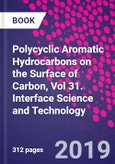Polycyclic Aromatic Hydrocarbons on the Surface of Carbon, Volume 31 helps researchers, scientists and PhD candidates find the right way to treat organic molecules. Although organic materials have been used everywhere, they are often handled as inorganic powders, a method that does not fully demonstrate their advantages. This book focuses on the processing methods of polycyclic aromatic hydrocarbons (PAH) molecules on different carbon matrices. The pros and cons of different methods are compared, thus enabling researchers, scientists and PhD students to find the ideal way to release the potential of the PAHs for diversified scenes.
- Provides a systemic discussion on the interactions between polycyclic aromatic hydrocarbons at interfaces
- Helps researchers and scientists working on PAHs to select the best approach to process their molecules
- Gives insight in how different components interact at interfaces in a PAH/carbon hybrid
Table of Contents
1. Introduction of PAHs 2. PAHs on graphene 3. PAHs on carbon nanotubes 4. PAHs on amorphous carbons
Authors
Wu, Dongqing Dongqing Wu received his PhD degree from Max Planck for Polymer Research in 2007 (Prof. Klaus Müllen's group). At the same year, he got the Chinese government award for outstanding self-financed students abroad. In the year 2010, he joined School of Chemistry and Chemical Engineering of Shanghai Jiao Tong University as a research fellow. His scientific interest is focused on the synthesis of organic functional materials and graphene based composites. He got the funding mainly from National Natural Science Foundation of China, Ministry of Education of the People's Republic of China and the Science and Technology Commission of Shanghai Municipality. He has published more than 80 publications in international scientific journals such as Chem. Soc. Rev., J. Am. Chem. Soc. and Angew. Chem. Int. Ed., etc. Liu, Ruili Prof. Ruili Liu joined the School of Electronic Information and Electrical Engineering in Shanghai Jiao Tong University since 2015. Her scientific interest is focused on the controllable synthesis of two-dimensional nanomaterials and their applications in optic, electronic and energy devices. In 2007, she received her Ph. D. degree from Prof. Dongyuan Zhao's group in Fudan University. At the same year, as the fellow of Alexander von Humboldt, she joined the group of Prof. Wolfgang Knoll in Max Planck Institute for Polymer Research (MPIP), Mainz, Germany. Since 2009, she worked as senior research fellow in the research group of Prof. Klaus Müllen in MPIP., Afterwards, she joined Shanghai University in 2010 and was elected as the special appointment professor (Eastern Scholar) by Shanghai Science & Education Committee in 2011.Prof. Liu has received the financial support from National Natural Science Foundation of China, Shanghai Science & Education Committee and the Science and Technology Commission of Shanghai Municipality. She has published 25 SCI papers in high-ranking scientific journals as Advanced Functional Materials, Journal of American Chemistry Society, and Scientific Reports, which have been cited over 1800 times.








